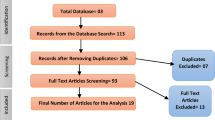Abstract
Death is inevitable and yet in US culture the discussion of death is somewhat taboo. Marriage and Family therapists are trained in the implications of grief and loss for clients who lose loved ones and yet examination of the impact of therapist mortality on clients is lacking in the clinical literature. This article examines ways that private practice therapists can both protect their client’s confidentiality and mitigate the impact of therapist sudden death on their clients with planning and forethought. In addition, the factors influencing the lack of empirical research on this topic is discussed in the context of social mores on death and how therapists’ own denial of mortality may impact their ability to connect with clients through the pain of grief and loss. Recommendations are made for therapists to evaluate their own attitudes towards mortality and develop a plan for client care in the event of their death.
Similar content being viewed by others
References
Baldwin, M. (Ed.). (2000). The use of self in therapy (2nd ed.). Binghamton, NY: The Hayworth Press.
Ballard, D. (2005). Planning ahead to close or sell your practice. In J. e. Barnett & M. Gallardo (Eds.), Handbook for success in independent practice (pp. 165–172). Phoenix, AZ: Psychologist in Independent Practice.
Beder, J. (2003). Picking up the pieces after the sudden death of a therapist: Issues for the client and the ‘inheriting therapist’. Clinical Social Work Journal, 31(1), 25–36. doi:10.1023/A:1021410501036.
Carr, K. M. (2007). The impact of death anxiety on therapists’ professional confrontation with death issues. Doctoral Dissertation, Capella University.
Connelly, R. J. (1997–1998). The medicalization of dying: A positive turn on a new path. Journal of Death and Dying, 36(4), 331–341.
Durkin, K. F. (2003). Death, denying, and the dead in popular culture. In C. D. Bryant (Ed.), Handbook of death and dying (Vol. 1, pp. 43–49). Thousand Oaks, CA: Sage.
Feinsilver, D. B. (1998). The therapist as a person facing death: The hardest of external realities and therapeutic action. International Journal of Psycho-Analysis, 79(6), 1131–1150.
Garcia-Lawson, K. A., Lane, R. C., & Koetting, M. G. (2000). Sudden death of the therapist: The Effects on the patient. Journal of Contemporary Psychotherapy, 30(1), 85–103. doi:10.1023/A:1003605316813.
Health Insurance Portability and Accountability Act of 1996, 42 U.S.C. § 1320d-9 (2010).
Henig, R. M. (2005, August 7). Will we ever arrive at the good death? The New York Times Magazine, 26–35. Retrieved from http://facultystaff.richmond.edu/~bmayes/pdf/Good_Death.pdf.
Kellehear, A. (1984). Are we a ‘death-denying’ society? A sociological review. Social Science & Medicine, 18(9), 713–721.
Kircheberg, T. M., & Neimeyer, R. A. (1991). Reactions of beginning counselors to situations involving death and dying. Death Studies, 15, 603–610. doi:10.1080/07481189108252548.
Kircheberg, T. M., Neimeyer, R. A., & James, R. K. (1998). Beginning counselor’s death concerns and empathetic responses to client situations involving death and grief. Death Studies, 22, 99–120. doi:10.1080/074811898201623.
Leming, M. R., & Dickinson, G. E. (2002). Understanding death, dying, and bereavement (5th ed.). New York: Harcourt College.
Luepker, E. T. (2003). Record keeping in psychotherapy and counseling: Protecting confidentiality and the professional relationship. New York, NY: Brunner-Routlege.
McGee, T. (2003). Observations on the retirement of professional psychologists. Professional Psychology: Research and Practice, 34, 388–395. doi:10.1037/0735-7028.34.4.388.
National Association of Social Workers: Code of Ethics (No. 1.07). Retrieved from http://www.socialworkers.org/pubs/code/code.asp.
Pinksy, E. (2002). Mortal gifts: A two-part essay on the therapist’s mortality, Part I: Untimely Loss. Journal of the American Academy of Psychoanalysis, 30(2), 173–204. doi:10.1177/00030651050530041901.
Pope, Kenneth S., Vasquez, Melba J. T. (2005). How to survive and thrive as a therapist: Information, ideas, and resources for psychologists in practice, (pp. 57–63). Washington, DC, US: American Psychological Association.
Silver, A. S. (2001). Facing mortality while treating patients: A plea for a measure of authenticity. Journal of the American Academy of Psychoanalysis, 29(1), 43–56.
Steiner, A. (2007). The empty chair: Making our absence less traumatic for everyone. New Therapist, 48, 11–22. Also retrievable from the author’s website: http://www.drsteiner.net/profwill_what.html. Accessed April 29th, 2011.
Terry, M. L., Bivens, A. J., & Neimeyer, R. M. (1995). Comfort and empathy of experienced counselors in client situations involving death and loss. Omega, 32(4), 269–285.
The American Association for Marriage and Family Therapy: Code of Ethics (No. 2.5). Retrieved from http://www.aamft.org/imis15/content/legal_ethics/code_of_ethics.aspx.
The American Association for Marriage and Family Therapy: Code of Ethics Proposed Revisions. Retrieved from http://www.aamft.org/imis15/Documents/2012%20Ethics %20Code%20For%20Comment%20PDF.pdf.
The American Association for Marriage and Family Therapy: Marriage and Family Therapy Core Competencies. Retrieved from http://www.aamft.org/imis15/Documents/MFT_Core_ Competencie.pdf.
The American Psychological Association: Ethical Principles of Psychologists and Code of Conduct (No. 3.12, 6.02). Retrieved from http://www.apa.org/ethics/code/index.aspx.
Traesdal, T. (2005). When the analyst dies: Dealing with the aftermath. Journal of the American Psychoanalytic Association, 53(4), 1235–1255.
Vlachos, I. I. (2011). Children of a mortal God: A therapy group’s journey in the wake of their therapist’s unexpected death. British Journal of Psychotherapy, 27(1), 93–110. doi:10.1111/j.1752-0118.2010.01224.x.
Walfish, S., & Barnett, J. E. (2009). Financial success in mental health practice: Essential tools and strategies for practitioners. Washington, D.C: American Psychological Association.
Zimmerman, C. & Robin, G. (2004). Denial of death thesis: Sociological critique and implications for palliative care. Palliative Medicine, 18, 121–128. doi:10.1191/0269216304pm858oa.
Author information
Authors and Affiliations
Corresponding author
Rights and permissions
About this article
Cite this article
Becher, E.H., Ogasawara, T. & Harris, S.M. Death of a Clinician: The Personal, Practical and Clinical Implications of Therapist Mortality. Contemp Fam Ther 34, 313–321 (2012). https://doi.org/10.1007/s10591-012-9181-y
Published:
Issue Date:
DOI: https://doi.org/10.1007/s10591-012-9181-y



